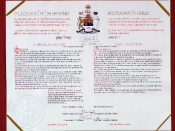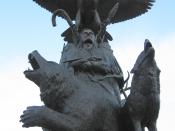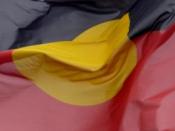Canada today is a vibrant multicultural society. It prides itself in its well-defined constitutional equality. Yet the majority of indigenous peoples, who first inhabited this proud land, are on reserved territory. The federal government granted this to them. In recent years, disputes arose over Aboriginal fishing and hunting rights. Law is not the one and only process that Aboriginals, who have been profusely discriminated against in the past and present, may use to gain sanctioned access to their natural born rights. However, factors from the past and present, like a cultural immerging scheme to a capitalistic society, have made it very difficult for Aboriginals to use another method of justice. The court system has deemed that the rights cannot be greater than they were at the time of European contact. Aboriginals have faced many hardships living in a 'majority rules' political system. Past attempts at gaining rights through the court process and referendums have failed to be successful.
Often times brought to the foreground are suggestions that they do not want to be 'Canadian'. For Aboriginals to better help themselves outside of the law they need to band together and set an example of accordance to the already set laws. A common element within arguments for or against Aboriginal rights is the question of equality.[2: Supreme Court of Canada, R. v. Marshall., 3 S.C.R. 533, s.l., September 1999.][3: Douglas Moodie, "Law and Politics: Aboriginal Rights," September 2007, p. 1.][4: Moodie, "Law and Politics", p.3.]
The fact that Aboriginals have been marginalized politically, economically, and socially over the past centuries shows the true 'colours' of a majority ruling government. What we know as the Canadian political system today derived from the British system. In both systems, there are many common laws. These laws have always been passed without Aboriginals' best interests...


